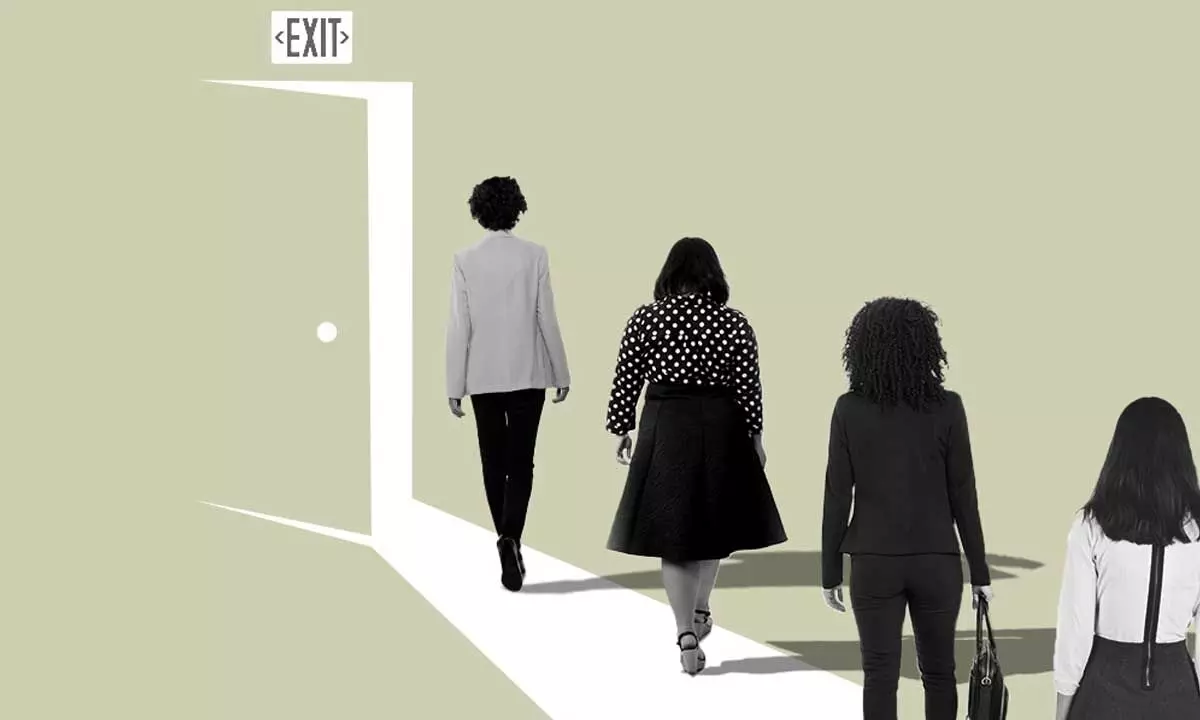Post Covid, 47% of laid-off women didn't resume jobs
Centre announced PMGKY scheme for transferring Rs1,500 to women-held PMJDY accounts for April, May and June 2020; However, only 23% of 465 women respondents in a survey received the cash transfer for all 3 months
image for illustrative purpose

Financial Inclusion of Women
- 42% of respondents did not receive cash transfers at all
- Over 90% of women withdrew cash for regular use
- 94% of the women who received the cash transfer, withdrew the money
- 11% saved the cash transfer or made online payments
- 8% invested the sum
Mumbai: It is estimated that compared to the seven per cent of men, who lost their jobs during the Covid-19 pandemic, 47 per cent of women lost their jobs permanently and did not return to the workforce in 2020.
To mitigate the gendered impact of the pandemic, the Indian Government announced the Pradhan Mantri Garib Kalyan Yojana (PMGKY) initiative for women holding Pradhan Mantri Jan Dhan Yojana (PMJDY) accounts. Under this initiative, the Union Government transferred Rs1,500 (Rs500 for three months) to women-held PMJDY accounts for months of April, May and June 2020, a study by Vidhi Centre for Legal Policy revealed.
Vidhi's latest report, 'Financial Inclusion of Women During the Pandemic: The Role of Jan Dhan Accounts and Cash Transfers,' assessed the effects of cash transfers on the financial behaviour of women, as well as overall accessibility and use of financial services by women during the pandemic. The report conducted a survey of 560 women across four districts in India.
This report is a part of the series, 'Lest We Forget,' by the Vidhi Centre for Legal Policy.
Talking to Bizz Buzz, Swarna Sengupta, Research Fellow, Fintech, Vidhi Centre for Legal Policy, says: "Cash transfer emerged as an important policy solution for many countries I ncluding India during the pandemic. India was able to quickly leverage its digital payments infrastructure to extend cash transfers to PMJDY women account holders as part of Pradhan Mantri Garib Kalyan Yojana," she said.
Despite this, the study found that "the implementation of this cash transfer was not satisfactory since only 23 per cent women respondents with PMJDY accounts (out of 465 women respondents) received the cash transfer for all three months."
According to the study, less than half the women surveyed received the cash transfers for all three months. 83 per cent of the total women respondents to the survey were PMJDY account holders. Only 23 per cent of the respondents with PMJDY accounts received cash transfers for all three months while 42 per cent of respondents with PMJDY accounts did not receive cash transfers in either of those three months. More than 90 per cent of women withdrew cash for regular use. 94 per cent of the women who received the cash transfer in any or all of the three months withdrew the money. Only a small fraction of respondents (11 per cent) saved the cash transfer or made online payments (8 per cent) or invested the sum (3 per cent).
Manvi Khanna, Research Fellow, Law, Finance and Development, Vidhi Centre for Legal Policy, says, "94 per cent of the women respondents who received the cash transfer in any or all of the three months withdrew the money, only a small fraction of such women respondents saved the cash transfer (11 per cent) or made online payments (8 per cent) or invested the sum (3 per cent). This shows that the financial behaviour of women in terms of saving, making online payments or investing was minimally impacted by such cash transfers. The lack of any advanced financial activity from the cash transfers may be attributed to the inadequacy of the amount of the cash transfer provided under PMGKY as well as its non-crediting for all of the three months."
Further, bank branches were preferred sites for withdrawal of money. Respondents who received cash transfers preferred going to bank branches to withdraw the money in comparison to accessing ATMs, banking correspondents or net-banking.
Lack of supporting infrastructure made access to cash difficult. The main challenges identified in accessing banking infrastructure during the lockdown included long travel and cost to avail of banking infrastructure, absence of cash in ATMs, banking correspondents not operating and bank branches not functioning.
It's very limited use of digital financial services by women. Despite having access to a phone, 39 per cent of the women respondents with a phone did not use it to conduct any financial transaction.

